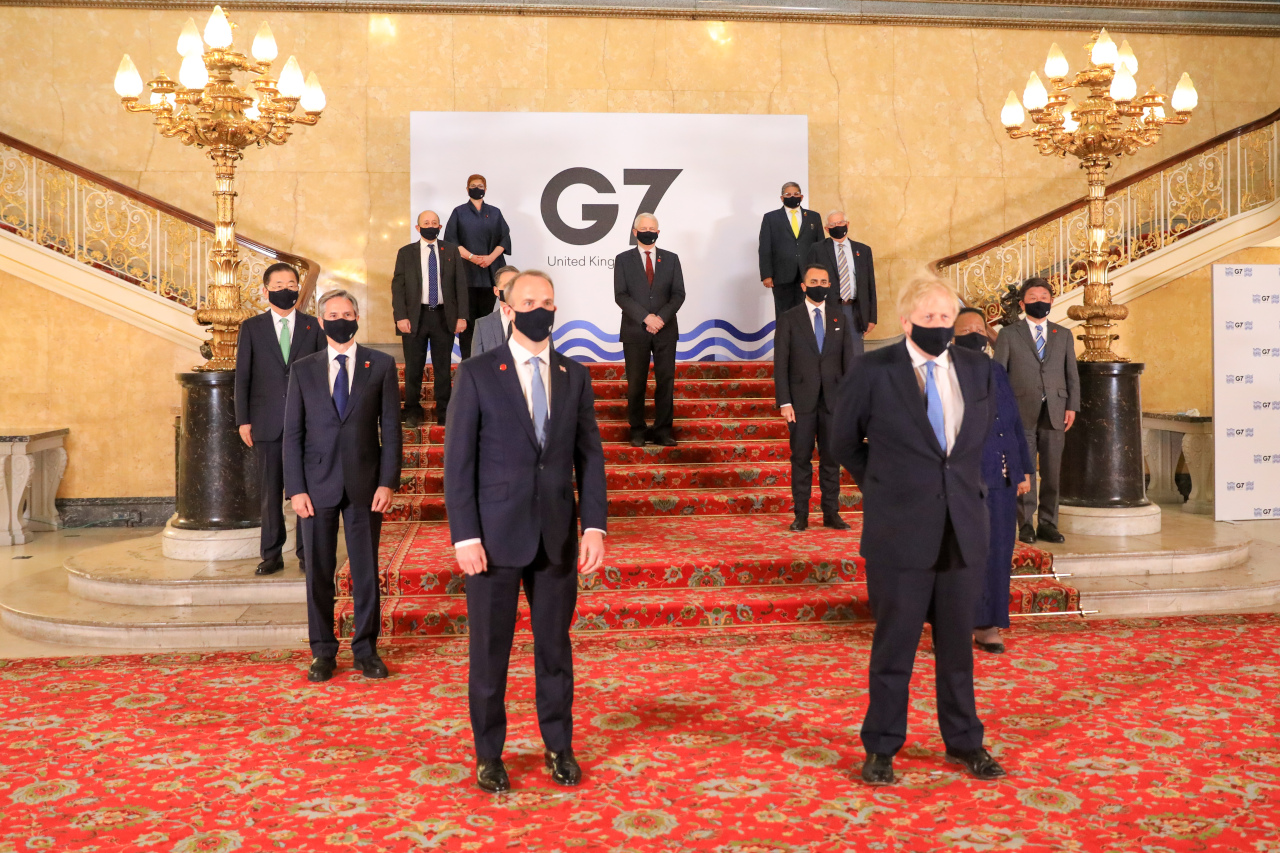
South Korean Foreign Minister Chung Eui-yong (third row, left)poses for a photo with British Prime Minister Boris Johnson (front row, right) and other foreign ministers during a meeting of the G-7 in London on Wednesday. (Ministry of Foreign Affairs)
Foreign Minister Chung Eui-yong has called on the international community to work together for the fair distribution of the COVID-19 vaccines at the meeting of Group of Seven countries, amid Seoul’s rising concern over a looming vaccine shortage.
Chung joined the in-person gathering of G-7 foreign and development ministers meeting in London from Tuesday to Wednesday, the Foreign Ministry said Thursday. South Korea was invited as a guest -- along with Australia, India, South Africa and Brunei -- to this year’s session of the Group of Seven wealthy democracies.
At the meeting, Chung underlined the “pressing need” for the international community’s cooperation in guaranteeing fair access to vaccines, and urged the G-7 countries to take the lead, the ministry said.
The G-7 foreign ministers also pledged to expand the production of affordable coronavirus vaccines, through working with industry, according to their joint statement released after the meeting.
Dealing with North Korea’s nuclear program was also high on the agenda of the meeting.
The Korean envoy called on the G-7 members for their support and cooperation in Seoul’s efforts for the denuclearization of the Korean Peninsula, which he described as “core” to ensuring peace and prosperity in the Indo-Pacific region.
The G-7 countries also urged North Korea to refrain from provocations and to return to talks for denuclearization, while throwing in support on the US’s efforts in this regard.
“We call on the DPRK to refrain from provocative actions and to engage in a diplomatic process with the explicit goal of denuclearization. We remain committed to the goal of complete, verifiable and irreversible abandonment of all of the DPRK’s unlawful weapons of mass destruction and ballistic missile programs in accordance with relevant UN Security Council resolutions,” the ministers said in a joint statement, abbreviating the North’s official name, the Democratic People’s Republic of Korea.
The member countries also stressed the imperative of fully implementing relevant UN Security Council resolutions on the reclusive regime.
“We regret that the DPRK has not taken concrete, verified actions toward denuclearization, and urge the DPRK to comply with all of its international obligations,” it said.
They also called on Pyongyang to resume inter-Korean dialogue, which has been stalled amid the deadlock in US-North Korea nuclear talks since 2019.
Meanwhile on Wednesday, Chung held bilateral talks with his European Union and German counterparts, Josep Borrell and Heiko Maas, on the sidelines of the G-7 session.
During his session with Borrell, the two sides agreed on the need to strengthen cooperation in responding to the climate change and environmental issues, and pledged cooperation for the upcoming Partnering for Green Growth and the Global Goals Summit, which Seoul is hosting.
Chung also explained the recent situation on the Korean Peninsula to the EU’s top diplomat, and the two sides agreed to have close communication and cooperation to bring advancement to the Korean peace process.
In his meeting with Maas, Chung also recognized Germany’s interest in and contributions to the Korean Peninsula, and raised hope of continuing close communications and cooperation to achieve peace.
Chung and his EU and German counterparts also agreed to explore mutually beneficial ways for cooperation on Seoul’s regional initiative, the New Southern Policy, and their respective policies on the Indo-Pacific.
The Korean envoy was set to hold meetings with his Australian and British counterparts, Marise Payne and Dominic Raab, respectively, Thursday.
By Ahn Sung-mi (
sahn@heraldcorp.com)






